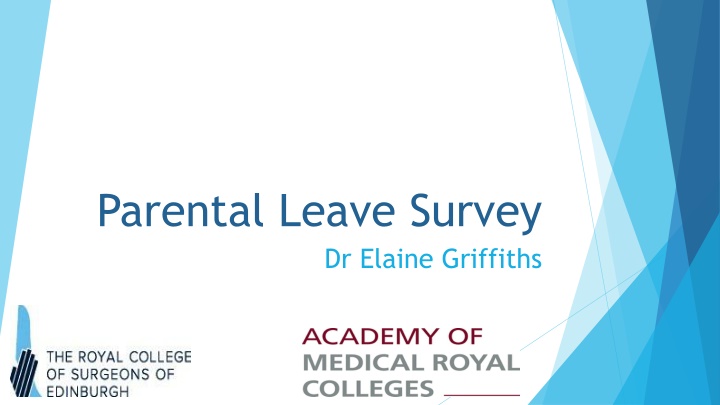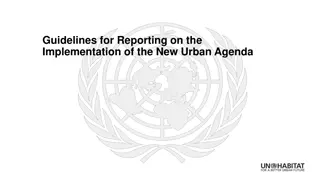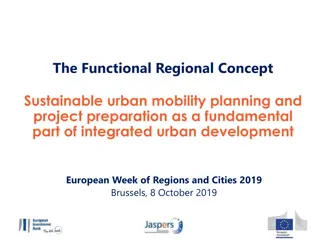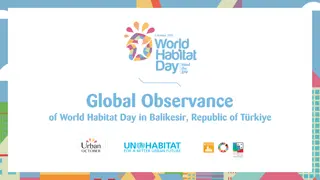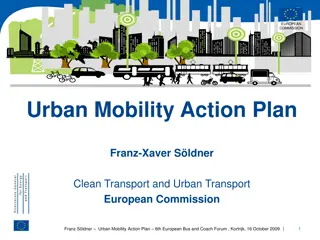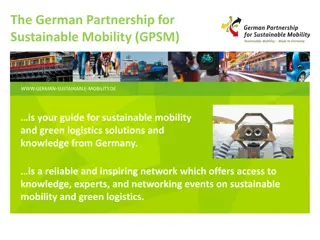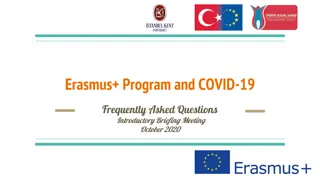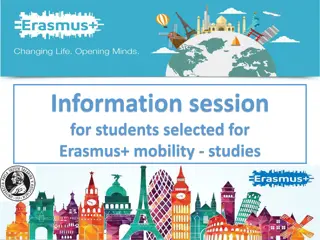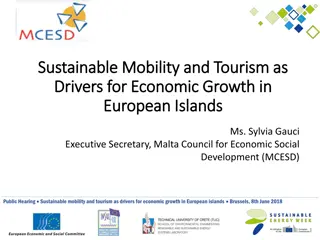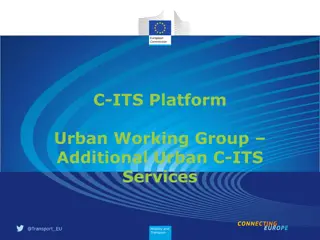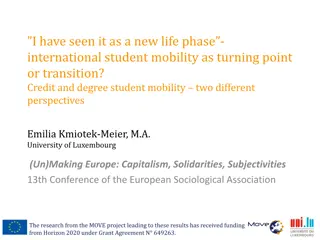Stimulating Cross-Sectoral Partnerships for Sustainable Urban Mobility
The Integrated Urban Development Strategy in Timisoara aims to stimulate cross-sectoral partnerships involving cultural, business, and technology sectors. This initiative is part of a broader effort to foster innovation, digitalization, and economic transformation in preparation for the upcoming ECoC mega-event and its legacy. The project, led by Project Manager Lavinia Simion, focuses on creating an entrepreneurial ecosystem oriented towards innovation and technological development. The approach involves coordinating various stakeholders to enhance urban mobility and drive sustainable growth in the region.
Download Presentation

Please find below an Image/Link to download the presentation.
The content on the website is provided AS IS for your information and personal use only. It may not be sold, licensed, or shared on other websites without obtaining consent from the author.If you encounter any issues during the download, it is possible that the publisher has removed the file from their server.
You are allowed to download the files provided on this website for personal or commercial use, subject to the condition that they are used lawfully. All files are the property of their respective owners.
The content on the website is provided AS IS for your information and personal use only. It may not be sold, licensed, or shared on other websites without obtaining consent from the author.
E N D
Presentation Transcript
Parental Leave Survey Dr Elaine Griffiths RCSEd
Parental Leave Survey Total 1225 Responses aged between 31- 50 yrs All Specialities/LETB s/Deaneries represented 80% white British but all ethnic groups represented Responses across all grades but specialist trainees the largest cohort We have been able to subdivide the groups into those taking maternity leave >5 yrs ago & those taking maternity leave <5yrs ago
Parental Leave Survey All male respondents taking only 10 -14 days of paternity leave No impact on their careers Parental leave taken >5 yrs ago 13%; <5 yrs figure rose to 22% Baseline for further studies
Parental Leave Survey Table: Grades Post 2010 Response 5% 10% 20% 25% 30% 40% 50% 60% 70% 80% 85% 90% 95% 100% Frequency Count 19 30 350 4 8 160 14 12 55 26 678 Foundation training grade Core training grade Specialist training grade Fixed term training post SAS/Specialty Doctor Consultant GP Principal GP Salaried doctor Other (eg Locum posts, LATs, post 2.90% 4.60% 53.70% 0.60% 1.20% 24.50% 2.10% 1.80% 8.40% Not Answered Total Responses
Parental Leave Survey Data suggest that the length of time taken for post-natal leave may be increasing Maternity leave duration post 2010 Response 0 2 3 4 5 6 7 8 9 10 11 12 13 14 18 24 32 34 52 Other Responses 5% 10% 20% 25% 30% 40% 50% 60% 70% 80% 85% 90% 95% 100% Frequency Count 8 4 5 6 15 52 20 39 60 40 30 102 4 3 3 3 3 2 2 6 407 2.00% 1.00% 1.20% 1.50% 3.70% 12.80% 4.90% 9.60% 14.70% 9.80% 7.40% 25.10% 1.00% 0.70% 0.70% 0.70% 0.70% 0.50% 0.50% 1.50% Total Responses
Parental Leave Survey Data indicated poor knowledge of available resources to aid planning Response 5% 10% 20% 25% 30% 40% 50% 60% 70% 80% 85% 90% 95% 100% Frequency 77.70% 29.50% 30.20% 28.00% Count 424 161 165 153 8 10 62 212 20 330 18 19 27 564 Information form HR/medical Information from payroll Government websites NHS employers' website Academy of royal colleges' website Medical women's federation Specialty / Colleges; / Faculties' BMA website Other website - please state Talking to colleagues Books - please state examples Other resources - please state None 1.50% 1.80% 11.40% 38.80% 3.70% 60.40% 3.30% 3.50% 4.90% Total Responses
Parental Leave Survey Prenatal concerns: Effect on clinical competence 79% CPD 57% Revalidation 24% Working relationships with colleagues 59% Finances 74% Childcare 78%
Parental Leave Survey Reasons for early return to work (post 2010) Response Personal finances Training linked deadlines Presssure from your department or Childcare opportunity you couldn't Concerns over compliance with Other please state: I felt no pressure to bring my 5% 10% 20% 25% 30% 40% 50% 60% 70% 80% 85% 90% 95% 100% Frequency 28.80% 10.40% Count 94 34 27 4 18 32 180 346 8.30% 1.20% 5.50% 9.80% 55.20% Total Responses
Parental Leave Survey Emotional Concerns (Post 2010) Response 5% 10% 20% 25% 30% 40% 50% 60% 70% 80% 85% 90% 95% 100% Frequency Count 21.90% 57.40% 14.40% 6.30% I looked forward to returning I had some reservations I did not feel emotionally ready to Other please state: 73 191 48 21 13 346 Not Answered Total Responses
Parental Leave Survey Less than 6% had Occupational Health Assessment or were aware of a risk assessment being performed on their return to work Despite 25% were experiencing post natal problems Sleep Deprivation results: Response 0-4 hours 5-7 hours 8 hours plus 5% 10% 20% 25% 30% 40% 50% 60% 70% 80% 85% 90% 95% 100% Frequency Count 50.10% 42.70% 7.20% 168 143 24 11 346 Not Answered Total Responses
Parental Leave Survey Keeping in touch days (KIT) Fewer than 50% discussed this option with their employers prior to maternity leave Only 25% were actually offered KIT days This figure dropped to 15% if the respondent was returning to a different Trust Many were not offered the recommended 10 days: Response 0 2 5 10 Other Responses 5% 10% 20% 25% 30% 40% 50% 60% 70% 80% 85% 90% 95% 100% Frequency Count 2 6 6 52 3 69 2.90% 8.70% 8.70% 75.40% 4.30% Total Responses
Parental Leave Survey Facilitating a smooth return to work: Only 20% offered opportunity to refresh/maintain clinical skills either during leave or after the return to work Nobody was offered a clinical attachment/shadowing prior to returning Only in Anaesthesia was any simulator experience to refresh resuscitation skills or the like given Only 5% were allocated a clinical supervisor/mentor to oversee their immediate return to work 75% were not informed of new policies or equipment changes which had occurred whilst they were on maternity leave Only 27% were provided with agreed milestones with, which to monitor their progress on returning to work, and information on how this was to monitored
Parental Leave Survey 50% were breastfeeding on return to work Only 8% were provided with a private space to express breast milk This resulted in 30% ceasing breastfeeding earlier than planned Other medical parents & partners were the most relied on resources when returning to work Childcare was a major concern: Response Straightforward Minor Difficulty Moderate Difficulty Very Difficult Almost Impossible 5% 10% 20% 25% 30% 40% 50% 60% 70% 80% 85% 90% 95% 100% Frequency 26.40% 26.10% 26.10% 15.70% Count 89 88 88 53 19 5 342 5.60% Not Answered Total Responses
Parental Leave Survey 80% of respondents were in full time work prior to taking maternity leave 60% were planning to return less than full time 1/3 of those who were returning less than full-time (LTFT) had difficulties arranging this Considerable frustration was expressed about managing a LTFT return to work Particularly the organisational paperwork, and the multiplicity of forms (as employer paperwork is distinct from that required by local education and training boards (LETBs)/deaneries)
Parental Leave Survey Overall Experience Rating: Response As expected Worse than expected Better than expected Yet to return 5% 10% 20% 25% 30% 40% 50% 60% 70% 80% 85% 90% 95% 100% Frequency Count 56.20% 17.60% 14.20% 12.00% 277 87 70 59 17 510 Not Answered Total Responses
Parental Leave Survey Action Points Remind Employers and colleagues of the importance of discussing voluntary arrangements around KIT days and ensure that the employees returning Trust if different is involved in these discussion Colleges; LETB s and Deaneries must be more proactive in promoting available resources to those seeking to take parental leave Mandatory for Employers to inform all colleagues on maternity leave of new developments/equipment and direct them to appropriate resources to familiarise themselves with the advances Encourage Employers to follow best practice ensuring that the first week of return to work is programmed as induction and shadowing a colleague to familiarising oneself with hospital procedures
Parental Leave Survey Action Points Risk assessments should be extended to include all mother s returning from maternity leave Deaneries/LETB s must ensure that the returning trainee has a designated educational supervisor who will meet with them prior to returning to work and actively monitor their progress in the first three months Returning Trainees must be given a designated consultant who will give them support and advice in the first three months
